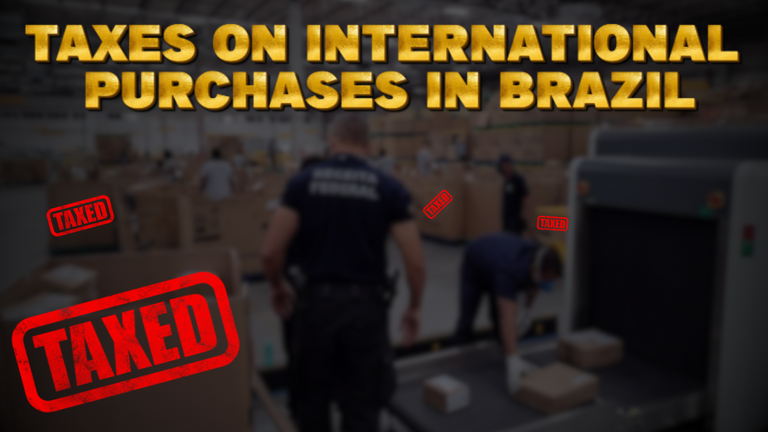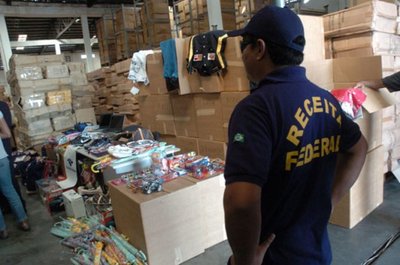Taxes on international purchases in Brazil

Click here to English Version.

Falar das taxas sobre compras internacionais no Brasil já virou uma grande novela que está durando muito tempo e quero compartilhar com vocês o desenrolar dessa história e o último posicionamento do governo neste assunto.
O governo brasileiro já tomou inúmeros posicionamentos diferentes à respeito desse assunto e por isso é tão difícil saber se haverá um consenso final sobre como tratar as compras internacionais. Quando falo sobre compras internacionais, quero dizer aquelas feitas pelo consumidor final em sites internacionais como Shopee, Shein e Aliexpress. O governo sempre disse que suas ações visavam proteger a indústria nacional, promover o desenvolvimento econômico e manter a balança comercial equilibrada no país, porém há algumas controvérsias que irei citar em breve.
Já faz mais de 60 anos que o Brasil adotou uma política de substituição das importações com essa desculpa de estimular a produção nacional e depender menos dos produtos estrangeiros. Essa narrativa é bem falha se considerarmos que vivemos em um mundo globalizado e não faz sentido forçar que o Brasil se torne um centro industrial de tecnologia e outros produtos quando todos sabem que o grande forte desse país é o Agronegócio e a Agropecuária, mas tudo bem. Utilizando essa desculpa o governo implementou taxas altíssimas para diminuir a competitividade e gerar esse "crescimento da indústria local e o aumento nos empregos".

Somente após 1990 o governo começou a mudar esse posicionamento para promover a abertura econômica, isso gerou a redução nas taxas de importação mas durou pouco tempo, nos anos seguintes novamente esse protecionismo nacional voltou à ser estabelecido e as taxas se tornaram novamente muito elevadas para quase todos os produtos. Esse posicionamento rígido tem persistido desde então e as importações permanecem com taxas altas para estimular o comércio local. Se você não é do Brasil deve estar se perguntando o que seria uma "taxa elevada", então este é o número: A taxa de importação representa 60% do valor total do produto (frete incluso), além de alguns Estados que também cobram o ICMS (Imposto sobre Circulação de Mercadorias e Serviços), ou seja, se você comprar um produto que custa $100 e for taxado, você terá que pagar $60 para os impostos de importação.
Eu sei que esses valores parecem absurdos mas há uma diferença entre o definido no papel e o que é verdadeiramente aplicado, então vamos nos aprofundar sobre como funciona na prática essas taxas de importação. Na teoria todas as compras internacionais realizadas por pessoas físicas DEVEM ser taxadas em 60% do valor do bem, entretando essa demanda é gigantesca e existem poucas unidades de desembaraço aduaneiro no país, então os funcionários não conseguem analisar todas as milhões de encomendas que chegam diariamente, conferir suas notas fiscais e emitir o boleto para pagamento das taxas. Por conta disso muitos produtos acabam passando sem nenhuma taxa, principalmente os pacotes pequenos. Além disso a maioria dos produtos que fiscalizados e taxados recebem valores bem abaixo dos 60% estipulados pelo governo, variando na média de 12%~25% do valor do produto.

Se considerarmos esses dois fatores então se torna extremamente viável fazer importações pois você consegue comprar produtos muito baratos, com qualidade e ainda existe a possibilidade de ser não ser taxado ou ser taxado em valores baixo, mas é claro que o governo não iria permitir que essa situação durasse por muito tempo então novamente nos últimos meses estão havendo grandes movimentos para tornar as políticas de importação mais rígidas. A maior culpa disso sempre acontecer são os acordos entre os políticos e os grandes empresários do país que possuem vários esquemas para "lavarem a mão um do outro", esse é o maior problema do Brasil e será difícil de ser quebrado algum dia. Nos meses de Fevereiro e Março houveram mudanças significativas (mas temporárias) nas importações: a maioria dos produtos estavam sendo taxados em valores muito elevados (60% ou mais) ou sendo totalmente barrados de entrar, inclusive uma das minhas compras foi barrada depois de esperar 2 meses pela entrega.

Ao iniciar Abril as compras não autorizadas diminuiram e muitos produtos voltaram a passar sem nehnuma taxa, porém algumas pessoas "sortudas" eram selecionadas para receber taxas absurdas, algumas chegavam a até 120% do valor do produto, quem iria pagar mais do que o dobro do que já foi pago em um produto apenas em taxas? Na lei diz 60%, na prática o que é realizado é algo totalmente aleatório! Essa situação já está se arrastando por muitos anos e está cada vez mais impraticável fazer compras internacionais.
Antes de falarmos sobre o posicionamento recente do governo sobre o assunto, vamos recapitular:
- O governo brasileiro criou uma taxa de 60% do valor total do produto para desencentivar as compras internacionais e favorecer a indústria local.
- Devido à enorme demanda a maioria das compras acabam passando sem taxas.
- As encomendas que são taxadas os valores costumam variar entre 12%~25%.
- O governo sente que precisa pressionar mais e com isso a maioria das encomendas não são autorizadas de entrar no país ou recebem taxas de 60% +.
- O governo tentou acabar com a isenção da taxa nas compras de pessoa física para pessoa física em produtos abaixo de $ 50,00 alegando abuso por parte das empresas.
- Há uma enorme comoção da polução contra as medidas do governo e as coisas começam a afrouxar.
Para os que não sabem o Brasil está passando por um momento bem intenso entre lados políticos e o governo atual precisa manter uma boa reputação, provavelmente por isso eles voltaram atrás na decisão de tornar rígidas as cobranças e começaram a buscar outras maneiras para encontrar um equilíbrio nesse assunto. Após uma reunião entre o Ministro da Economia Fernando Haddad e equipe com os sites asiáticos, foi sugerida a implementação do pagamento automático das taxas de importação para as compras online. Como essa nova política fiscal funcionaria: Ao invés dos produtos precisarem passar por um centro e ficar dias em fiscalização, aguardar o pagamento e só depois liberar a entrega, o comprador já iria pagar a taxa de importação no ato da compra (semelhante ao conceito de pré-pagamento), isso resolveria a demora na entrega e principalmente a incerteza sobre o produto ser ou não taxado e o valor que seria cobrado. Entretanto ainda há um problema, ninguém está disposto à pagar 60% de taxa de importação afinal é um valor absurdamente alto!

Considerando tudo que está acontecendo ao longo dos anos sobre esse assunto é possível fazer uma teoria dos jogos e perceber que se o governo ceder um pouco em suas decisões é possível que essa medida seja muito efetiva, pois resolveria o problema das muitas compras que não são taxadas, agilizaria o processo de entrega e o consumidor ficaria feliz em pagar uma taxa justa, então se o governo ceder e diminuir essa taxa ridícula de 60% para algo mais realista como 15%~20%, então talvez seja possível finalmente encontrar um equilíbrio perfeito para as taxas sobre importações, criando um sistema funcional, justo e que gerará receita constante aos cofres públicos.
Muito obrigado a todos que leram até aqui, espero que tenham gostado. Se vocês curtirem meus conteúdos, peço que deixem o seu voto na postagem e sigam o meu perfil para poderem acompanhar as futuras postagens.






Talking about taxes on international purchases in Brazil has become a big soap opera that has been going on for a long time and I want to share with you how this story unfolds and the latest government position on this issue.
The Brazilian government has already taken many different positions on this issue and that is why it is so hard to know if there will be a final consensus on how to treat international purchases. When I talk about international purchases, I mean those made by the end consumer on international websites such as Shopee, Shein and Aliexpress. The government has always said that its actions were aimed at protecting the domestic industry, promoting economic development and keeping the balance in the country, but there are some controversies that I will mention shortly.
It has been more than 60 years since Brazil adopted a policy of import substitution with this excuse of stimulating national production and depending less on foreign products. This narrative is quite flawed if we consider that we live in a globalized world and it makes no sense to force Brazil to become an industrial center of technology and other products when everyone knows that the great strength of this country is agribusiness and livestock farming, but all right. Using this excuse the government implemented very high taxes to decrease competitiveness and generate this "growth of local industry and increase jobs".

Only after 1990 the government started to change this position to promote economic openness, this generated a reduction in import tariffs but it only lasted a short time, in the following years again this national protectionism was established again and tariffs became again very high for almost all products. This rigid position has persisted ever since and imports remain at high rates to stimulate local commerce. If you are not from Brazil you must be wondering what is a "high taxes", so this is the number: Import tax represents 60% of the product total value (freight included), plus some states also charge the ICMS (Tax on Circulation of Goods and Services), meaning that if you buy a product that costs $100 and gets taxed, you will have to pay $60 for import taxes.
I know that these values seem absurd but there is a difference between what is defined on paper and what is actually applied, so let's delve into how these import taxes work in practice. In theory all international purchases made by individuals SHOULD be taxed at 60% of the value of the goods, however this demand is huge and there are few customs clearance units in the country, so the employees cannot analyze all the millions of orders that arrive daily, check their invoices and issue the payment slip. Because of this many products end up passing without any tax, especially small packages. Moreover most of the products that are inspected and taxed receive values well below the 60% stipulated by the government, ranging on average from 12%~25% of product value.

If we consider these two factors then it becomes extremely viable to make imports because you can buy very cheap products, with quality and there is still the possibility of not being taxed or being taxed at low values, but of course the government would not allow this situation to last long so again in recent months are having major movements to make import policies stricter. The biggest blame for this always happening is the agreements between the politicians and the big businessmen of the country that have various schemes to wash each other's hands, this is the biggest problem in Brazil and it will be hard to break it someday. In February and March there were significant (but temporary) changes in imports: most products were being taxed at very high rates (60% or more) or being totally barred from entering, including one of my purchases was barred after waiting 2 months for delivery.

At the beginning of April unauthorized purchases decreased and many products returned to pass without any fee, but some people "lucky" were selected to receive absurd rates, some reached up to 120% of product value, who would pay more than double what was already paid on a product only in taxes? The law says 60%, in practice what is done is totally random! This situation has been going on for many years and it is becoming increasingly impractical to make international purchases.
Before we talk about the government's recent position on the subject, let's recap:
- The Brazilian government created a tax of 60% of the product total value to discourage international shopping and favor local industry.
- Due to the huge demand most purchases end up going through without tax.
- The orders that are taxed usually vary between 12%~25%.
- The government feels that they need to put more pressure on them, so most orders are either not allowed to enter the country or are taxed at 60% +.
- The government tried to end the tax exemption on purchases from person to person on products under $ 50.00 alleging abuse by companies.
- There is a huge public outcry against the government's measures and things are starting to loosen up.
For those who don't know, Brazil is going through a very intense time between political sides and the current government needs to maintain a good reputation, probably because of this they went back on the decision to make the charges stiff and started looking for other ways to find a balance in this matter. After a meeting between the Minister of Economy Fernando Haddad and team with the Asian sites, it was suggested to implement automatic payment of the import taxes for online purchases. How this new fiscal-policy would work: Instead of the products having to pass through a center and stay for days in inspection, wait for payment and only then release for delivery, the buyer would already pay the import tax at the moment of purchase (similar to the concept of pre-payment), this would solve the delay in delivery and especially the uncertainty about whether the product is taxed or not and the amount that would be charged. However there is still a problem, no one is willing to pay 60% import tax after all it is an absurdly high amount!

Considering everything that has been happening over the years about this issue it is possible to do a game theory and realize that if the government gives in a little on its decisions it is possible that this measure will be very effective, because it would solve the problem of many purchases that are not taxed, it would speed up the delivery process and the consumer would be happy to pay a fair tax, so if the government gives in and lowers this ridiculous 60% rate to something more realistic like 15%~20%, then it might be possible to finally find a perfect balance for import taxes, creating a system that is functional, fair and will generate constant revenue to the public coffers.
Thank you so much to everyone who read this far, I hope you enjoyed it. If you like my content, I ask you to send your vote on the post and follow my profile so you can read future posts.



Obrigado por promover a comunidade Hive-BR em suas postagens.
Vamos seguir fortalecendo a Hive
!hiqvote
@underlock, the HiQ Smart Bot has recognized your request (1/2) and will start the voting trail.
In addition, @underlock gets !LOL from @hiq.redaktion.
For further questions, check out https://hiq-hive.com or join our Discord. And don't forget to vote HiQs fucking Witness! 😻
Congratulations @underlock! You have completed the following achievement on the Hive blockchain And have been rewarded with New badge(s)
Your next target is to reach 130000 upvotes.
You can view your badges on your board and compare yourself to others in the Ranking
If you no longer want to receive notifications, reply to this comment with the word
STOPCheck out our last posts:
Ninguem merece esse tanto de taxa ainda mais em um sistema falho desses.
Excelente post!
!1UP
Click this banner to join "The Cartel" discord server to know more.
E o valor dessas taxas são absurdas, cara, 60% é surreal!
You have received a 1UP from @lipe100dedos!
@leo-curator, @bee-curator, @pimp-curator, @vyb-curator, @pob-curator, @neoxag-curator, @cent-curator
And they will bring !PIZZA 🍕.
Learn more about our delegation service to earn daily rewards. Join the Cartel on Discord.
$PIZZA slices delivered:
@curation-cartel(3/20) tipped @underlock
This post has been manually curated by @alokkumar121 from Indiaunited community. Join us on our Discord Server.
Do you know that you can earn a passive income by delegating to @indiaunited. We share more than 100 % of the curation rewards with the delegators in the form of IUC tokens. HP delegators and IUC token holders also get upto 20% additional vote weight.
Here are some handy links for delegations: 100HP, 250HP, 500HP, 1000HP.
100% of the rewards from this comment goes to the curator for their manual curation efforts. Please encourage the curator @alokkumar121 by upvoting this comment and support the community by voting the posts made by @indiaunited.
Yay! 🤗
Your content has been boosted with Ecency Points, by @underlock.
Use Ecency daily to boost your growth on platform!
Support Ecency
Vote for new Proposal
Delegate HP and earn more
Your post was manually curated by @KaibaGT.
Delegate your HP to the hive-br.voter account and earn Hive daily!
🔹 Follow our Curation Trail and don't miss voting! 🔹
They added this taxes (more accurately they increased it significantly) in Croatia too few years ago... Damn that hurt my online shopping a lot 😣
And the reasons were the same as what you have now..
Fortunately there is so much demand here that they cannot apply these fees in practice, but should they actually come into effect, it will be chaos